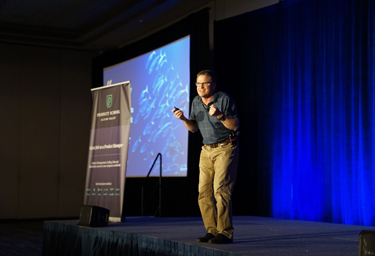Modules

Foundations
Communication is integral to our lives. It is how we exchange information and make meaningful connections to ourselves, others, and the world around us. It is how we socialize and create communities.
Communication allows us to express ourselves, so others can understand our perceptions, beliefs, and values. Communication also forms and changes those perceptions, beliefs, and values.
Communication can be verbal or non-verbal. It occurs in all settings, and it is ever evolving. Most importantly, it is a skill we can develop. Effective communication can help us in our personal, academic, and professional lives. At heart, communication is the primary way we interact with the world, and therefore, it is our primary means of changing it.

Build Your Tool Kit
Zero in on the craft of communication–the tools and techniques you’ll use in almost any writing project or communication context. Learn how to design, plan, and test a writing project, how to write with clarity and concision, how to write prose that feels smooth and connected. Learn how to read context to determine what counts as “correct” communication. Finally, practice writing high-impact prose that appeals to readers with its use of concrete details and storytelling techniques, even if you’re writing academic or non-narrative prose.

Absorb
Absorbing requires patience, empathy, and consideration. You must be willing to listen to different viewpoints and to reflect and consider before contributing to the conversation.
Focus on listening closely to the author of the message with an open and curious mind, a lack of judgment, and empathy and respect for their views and experiences.
Start by pausing, preparing, and framing. Then skim, scan, and revisit. Understand the actual words on the page. Situate a source to understand its context. Use tools to further your understanding and demonstrate this through breaking it down, summarizing, and paraphrasing. Move to responding and questioning, and finally to inferring, drawing conclusions based on evidence.

Critique
To critique an argument, narrative or other text is first of all to converse with it and explore it in depth, asking critical questions. The result of your appraisal may be to reject some or all of the text’s claims, or it may be to affirm them. Either way, we need to be able to verify the reliability and accuracy of the source, recognize when it contains logical fallacies, and question its assumptions. Practice techniques of close critical analysis to engage meaningfully with the arguments all around us.

Research
Research is about inquiry, learning, and the process of putting sources in conversation to create new meaning. Focus on core skills of initiating, planning and organizing a research project. Examine how to locate different types of sources and document your searches, and explore how to assess sources for relevancy, accuracy and credibility. Practice integrating and contextulizing data from your sources and weaving it into a larger whole.

Share
Share your work using verbal and non-verbal communication. Use words, voice, and body language to convey a clear message to the audience in a public speech. Learn how to analyze your audience, persuade and inform others, draft a speech, and use modern presentation tools.






